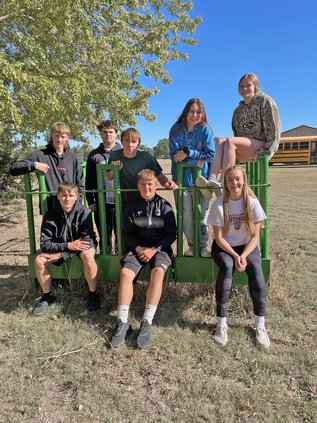KIOWA – Have you ever had a time that you were apprehensive and a little gun shy? How about not too sure of yourself but you really wanted to give it a shot? That’s largely what Central Plains High School ag students-FFAers experienced when they got their feet wet judging livestock at Kiowa.
In the recent past, several students have had the opportunity to evaluate cattle at the Poland Angus judging contest north of Medicine Lodge, but that was only cattle. Throw in three new species—sheep, goats, swine, and multiply that by two with each species being either market or breeding and the kids now have a situation never experienced before. Talk about redefining the term livestock judging.
The first two lines of the FFA motto state: “Learning to Do; Doing to Learn.” Central Plains students were the epitome of those two phrases; they learned by doing.
“Exposure and experience are some of the greatest teachers. Combine that with what they’re learning in the classroom and they’ll get it figured out,” stated Wayne DeWerff, ag instructor. “For all but two, this is completely new. They took their lumps the day of the contest, but follow-up the next day in class proved invaluable. A great lesson on animal ID traits from the market hog and goat classes helped get the kids draw an association for what they’re likely to see at dairy cattle evaluation. Kiowa livestock provided the perfect teaching tool scenario to learn from that experience.”
Students typically provide pretty good feedback in regard to their experience. Junior Melissa Donecker took a very proactive approach: “This particular livestock competition got me out of my comfort zone. I competed in livestock judging last year, but didn’t partake in oral reasons. So, giving two sets in front of reasons takers found me quite nervous to say the least. However, turning it into a positive, it was a great opportunity for me to work on my impromptu speaking skills. I’m grateful to have been given the opportunity to compete for my school,” Donecker expressed.
One has to appreciate senior first-timer Evan Stratmann’s comment: “The contest was enjoyable but nerve-wracking at the same time. Much of how I’ve learned to evaluate livestock to this point has been by listening to the people around you – your dad, other farmers, livestock people, and even market analysts on the radio. They’re the ones who know what the industry is looking for, be it cattle, hogs, or others — so why not listen to them.”
One can appreciate freshman Sierra Marsell’s response: “Even though I didn’t know much about livestock I still went and I am so glad I did because it was a great learning experience.”
Comments like those are always welcomed and as for DeWerff, they provide a path to help get the students more comfortable, confident, and knowledgeable in their livestock selection abilities.
He stated some catch on quickly while some struggle with grasping the terminology and lingo used in the industry. Exposure is the key. Listen to the judge’s comments when he gets on the mike to confirm and explain his placings on a class. Listen not only to what he talks about but just as importantly how he talks — his mannerisms, his flow, his transitional words and phrasing, his grants, criticisms, and overall knowledge of the animal industry.
Picture yourself on the end of a microphone or in front of a mirror — and listen to your words and watch your body language as you speak. It’ll definitely impact your preparedness.
DeWerff challenges his students to take that leap of faith and jump into livestock selection and evaluation. He admits it isn’t for all kids, but whether they like it or not, most will have a connection to agriculture and livestock in some way the rest of their lives.
Well, how did they do? For DeWerff, the answer would be much like that old farmer statement: “They did all right — they’re gettin’ there.” However, the best question would be, “what did they learn?” That will tell the real story and as far as he can tell, “we never quit learning,” DeWerff concluded.








